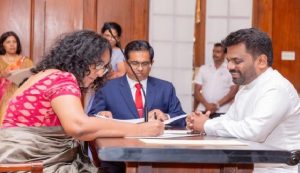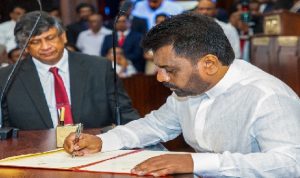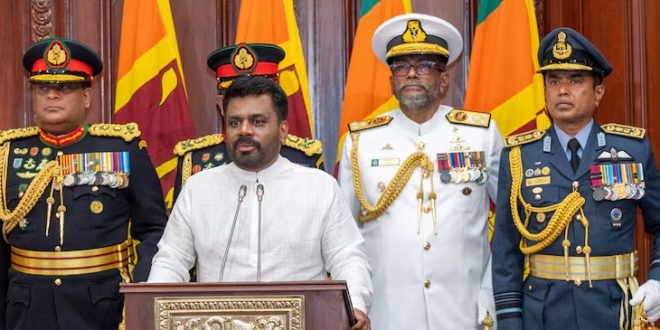26-09-2024
COLOMBO: Sri Lanka’s newly elected President Anura Kumara Dissanayake has dissolved parliament to clear the way for a snap general election in the debt-ridden country, he said in a government gazette notification on Tuesday.
The parliamentary election will be held on Nov. 14, the notification said, adding that the next parliament would convene on Nov. 21.
 The last general election in Sri Lanka was held in August 2020. Lawmakers are elected for a five-year term.
The last general election in Sri Lanka was held in August 2020. Lawmakers are elected for a five-year term.
Sri Lankans chose Dissanayake in a weekend presidential election, giving the Marxist-leaning politician a key role in deciding the future of reforms in the island country that is slowly emerging from a crushing financial crisis but his coalition, the National People’s Party, has just three of 225 seats in the current parliament, prompting him to dissolve the legislature to seek a fresh mandate there for his policies. Saturday’s presidential vote was Sri Lanka’s first election since its economy buckled in 2022 under a severe foreign exchange shortage, leaving it unable to pay for imports of essentials including fuel, medicine and cooking gas. Protests forced then-President Gotabaya Rajapaksa to flee and later resign.
Dissanayake promised to bring change for those reeling under austerity measures linked to a $2.9 billion IMF bailout program following the economic crisis and has also pledged to expand existing welfare schemes but his intentions to slash taxes and desire to revisit the terms of the bailout have worried investors, who fear that it could delay a crucial $25 billion debt restructuring.
He will have to ensure the economy returns to sustainable and inclusive growth, reassure local and international markets, attract investors and help a quarter of the 22 million population climb out of poverty.
The Parliament of the Democratic Socialist Republic of Sri is the supreme legislative body of Sri Lanka. It alone possesses legislative supremacy and thereby ultimate power over all other political bodies in the island. It is modeled after the British Parliament. The 16th Parliament of Sri Lanka was dissolved on 24 September 2024.
It consists of 225 members known as Members of Parliament. Members are elected by proportional representation for five-year terms, with universal suffrage.
 The President of Sri Lanka has the power to summon, suspend, prorogue, or terminate a legislative session and to dissolve the Parliament. The President can dissolve Parliament only after the lapse of 2+1⁄2 years or if a 2⁄3 majority of Members of Parliament requests him. The action of the president to either suspend or dissolve the Parliament is subject to legal scrutiny of the Supreme Court of Sri Lanka. The Speaker or, in his absence, the Deputy Speaker and Chairman of Committees or the Deputy Chairman of Committees, presides over Parliament.
The President of Sri Lanka has the power to summon, suspend, prorogue, or terminate a legislative session and to dissolve the Parliament. The President can dissolve Parliament only after the lapse of 2+1⁄2 years or if a 2⁄3 majority of Members of Parliament requests him. The action of the president to either suspend or dissolve the Parliament is subject to legal scrutiny of the Supreme Court of Sri Lanka. The Speaker or, in his absence, the Deputy Speaker and Chairman of Committees or the Deputy Chairman of Committees, presides over Parliament.
The Standing Orders of Parliament are the agreed rules under which procedure, debate, and the conduct of Members in the House are regulated. It defines the procedure for the functioning of Parliament, thus becoming an important source of Parliamentary Procedure. Standing Orders have the status of rules under the Constitution, and date back to the first set of Standing Orders adopted by the Legislative Council of Ceylon in 1912, based those of the Parliament of the United Kingdom. These have been changed multiple times and the current set of Standing Orders dates back to 1979.
Following the Westminster model, all legislation in Sri Lanka must be passed by the Parliament to become law and it controls taxation and the supply of money to the government. Parliament’s ability to make laws, includes those that have retrospective effect and repealing or amending any provision of the Constitution. (Int’l Monitoring Desk)
 Pressmediaofindia
Pressmediaofindia




